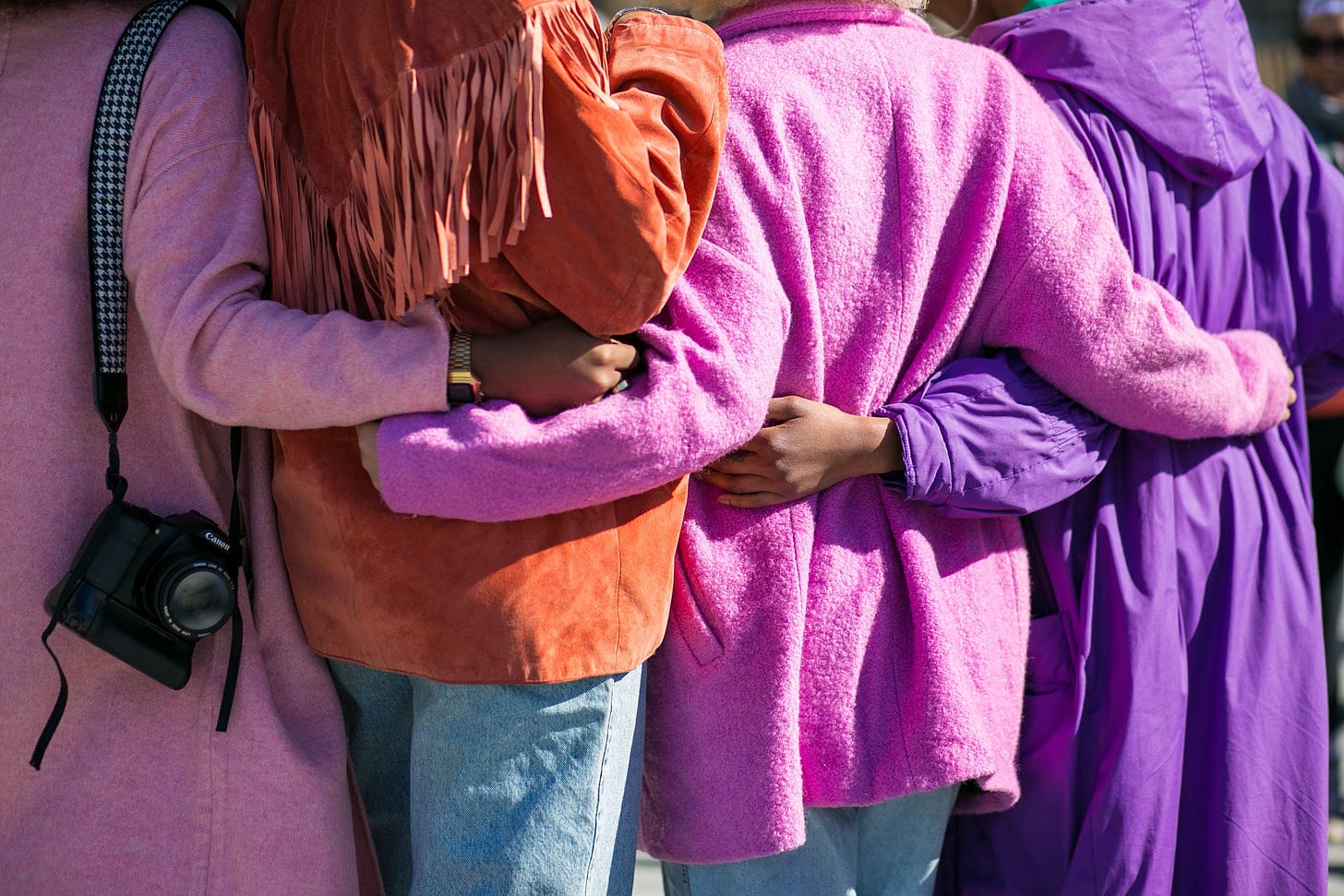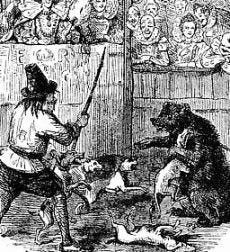A Common Flourishing
Reflecting on Marx, Tolkien, Shakespeare, Dr. King, Heschel, the prophet Isaiah, and Ricky Bobby, I attempt to answer the question - what might a common flourishing look like? And would we want it?

View
It is said we live in a polarized society, where much of the conversation and noise comes from the extremes. That means there is a lot of noise. It also means conflict, it means war - in fact, we call it a culture war. It may seem strange to call a cultural conflict a ‘war’ while we are in the middle of a real, shooting, life and death war in Ukraine - but it is a war in one sense of the word. Each side seems to believe they must defeat the other. An unconditional surrender is required - total victory is necessary for the survival of all that we hold dear.
This idea has many fathers, but one of those fathers is Marx, which is ironic, given that the accusation of Marxism is one of the weapons in our culture war. In Marxism, there is no improvement, no win-win, no common flourishing possible - there is a class war and one side must crush the other. The corrupt system must be overthrown, abolished, eliminated. In areas where Marxists have seized power, reeducation camps spring up to forcibly convert a participant on one side to the other side - conversion or destruction are the only options. That feels like where we are. What Marx said about history and class, we now say about cultural conflicts of all varieties. They, our culture war opponents, must be destroyed or reeducated - they are the enemy.
One of the reasons this mindset is damaging is its tendency to spread. It is seen not just in the obvious ways playing out in the public square ( Antifa vs Proud Boys / MAGA vs ‘woke’ ), but it leaks into almost every area of life. Women are pitted against men, rich against poor, black against white, straight against queer, and young against old. It isn’t a matter of preference - it is a conflict where there must be, in every case, a loser. To win means the other loses. Their win means we have lost. Our gain is their setback. It is a zero-sum, scarcity mentality affair. It is a war footing applied to culture, media, and relationships. As Ricky Bobby said, ‘there are no second winners” … or maybe it was Tiger Woods. When you define your win by their loss - if you forget even what you are fighting for and are only seek to defeat the other side - you create a world in which there can only be one winner. Their win is the only definition of your loss, just like their humiliation is the only definition of your win.

And win we must. We no longer seek to advance, to solve problems, to move forward. We must win. We must defeat them, humiliate them, crush them, destroy them, own them, drink their tears … etc. As I said, this mindset is corrosive and threatens to leak into most of our relationships. But, mostly, it is just wrong. It is a complete misunderstanding of us and of others - of who we are and why we are here. The world we actually live in is a world meant for flourishing - a flourishing that can only flourish if it is a common flourishing.
Near the end of Shakespeare’s Macbeth, the title character is doomed and says that his enemies “have tied me to a stake; I cannot fly, / But, bear-like, I must fight the course.” That likely seems obscure to us, but in 1606 the reference would have been obvious to the audience. Macbeth is comparing himself to a bear involved in what was the extremely popular blood sport of “bear baiting.” The bear was chained to a stake - or multiple stakes - and attacked by dogs or, sometimes, men with weapons. Either the bear killed most of the dogs or was brought to his demise. This bear, this great object of fear, this enemy, not only defeated but humiliated. Before they fled England - and the culture behind bear baiting was one of their reasons - the Puritans strongly opposed the practice. We would oppose it on the grounds of cruelty to the animals. The Puritans opposed it not simply because it was cruel to the animals, but because of what that cruelty did to the humans. As Thomas Macauley said, “the Puritan hated bear-baiting, not because it gave pain to the bear, but because it gave pleasure to the spectators.” Which might seem right on brand for our idea of the pleasure-hating Puritans. But it wasn’t pleasure per se that worried them, it was the object of the pleasure that debased the people watching. I think the Puritans were right on that score. To take pleasure in the suffering, the defeat, the humiliation, the debasing of one of God’s creatures - animal or human, is, literally, beneath us. Or it should be.
But much of the culture war interactions all around us are just a version of bear baiting. I would say a refined version, but bear baiting was a practice of only the most refined in Elizabethan England. And the most refined among us are not immune to the allure of taking pleasure in the suffering of those we oppose. It is beneath us. It isn’t just how we treat others, it is how we think of them. And how we think of them can’t be separated from the implications it has for how we must think of ourselves.
Dr. Martin Luther King Jr. spoke to a group of Junior High school students in October of 1967. He said,
“Number one in your life’s blueprint should be a deep belief in your own dignity, your worth and your own somebodiness … always feel that your life has worth, and always feel that your life has ultimate significance.”
Dr. King believed the basis for the “somebodiness” of everybody is that we were made in the image of God. But not only are you created in God’s image, so is everyone else. Everyone else, in bearing the image of God, has ultimate significance. Celebrating the debasing of God’s image in another is ultimately a betrayal of the basis of our own significance. Violating their “somebodiness” degrades our own.
Some may think me naïve, that I don’t know how bad they really are - how much damage they are doing. I doubt it. Most people who know me would not consider me naïve. I see the badness. But to define others by what we understand to be the damage wrought by their views is to define them as something less than fully human, something other than image bearers. Even if they define themselves in this way. It is, as Tim Keller said,
“to exclude them from the community of humanity and to exclude us from the community of sinners.”
I am not saying they aren’t bad - I am saying they (whoever they are) aren’t wholly bad and that we (whoever we are) are not wholly good. We are human - fallen and made in God’s image. As are they.
The heart of man is not compound of lies,
but draws some wisdom from the only Wise,
and still recalls him. Though now long estranged,
man is not wholly lost nor wholly changed.
(from Mythopoeia - J.R.R. Tolkien)
The only way forward is the way of a flourishing that does not exclude the flourishing of others. A common flourishing. If I seek to flourish at the expense of other image bearers, I am, unwittingly perhaps, a part of the bear baiting spectacle of our culture wars. I debase myself. I haven’t said anything about any particular area of flourishing or how we flourish together. I began this with an idea to write something along those lines, but that will have to wait for later - this is already getting long. And before we talk about what it looks like, I would like for us to agree that it is a good thing to want - that a common flourishing is the goal. Perhaps I am naïve.

It might seem quaint to some that working toward this flourishing is also demanded. It is not up to us to evaluate this demand or to hold it up to determine its reasonableness. This is a Christian view, but it is not only a Christian view. The Jewish philosopher Abraham Heschel wrote that what God “demands” of us is a definitive aspect of what makes us human.
“human living as being-challenged-in-the-world can be understood only in terms of requiredness, demand, and expectation. Significant living is an attempt to adjust to what is expected and required of a human being.” Abraham Heschel “Who is Man?”
We can’t stop being human, but we can fail to live up to our status as human beings. We can live insignificant lives partly by ignoring the demand to honor one another … by bear baiting. It turns our that we are our brother’s keeper, like it or not. It is what we were made for. We were made for shalom.
In Cornelius Plantinga’s wonderful book Not the Way It’s Supposed to Be - A Breviary of Sin, we read:
The webbing together of God, humans, and all creation in justice, fulfillment, and delight is what the Hebrew prophets call shalom. We call it peace, but it means far more than mere peace of mind or a cease-fire between enemies. In the Bible, shalom means universal flourishing, wholeness, and delight - a rich state of affairs in which natural needs are satisfied and natural gifts fruitfully employed, a state of affairs that inspires joyful wonder as its Creator and Savior opens doors and welcomes the creatures in whom he delights. Shalom, in other words, is the way things ought to be.
Part of the challenge of our time (and perhaps of any time) is our inability to even imagine what this might look like. It is difficult to move toward something that is so foreign to our experience. Plantinga attempts a short description of this state of affairs -
… All over the world, people would stimulate and encourage one another’s virtues. Newspapers would be filled with well-written accounts of acts of great moral beauty, and, at the end of the day, people on their porches would read these and savor them and call to each other about them … Above all, in the visions of Christians and other theists, God would preside in the unspeakable beauty for which human beings long and in the mystery of holiness that draws human worship like a magnet. In turn, each human being would reflect and color the light of God’s presence out of the inimitable resources of his or her own character and essence. Human communities would present their ethnic and regional specialties to other communities in the name of God, in glad recognition that God, too, is a radiant and hospitable community, of three persons. In their own accents, communities would express praise, courtesies, and deferences that, when massed together, would keep building like waves of passion that is never spent.
It is easy to say that we don’t have shalom at present, or anything close to it at any scale - there are, I believe, pockets approaching it here and there, largely out of cultural view. But Christians especially should recognize that this is what we are made for, that this is who we really are, that this is our destiny, that this is the story we are really in. We won’t have shalom but we should recognize we are made for it. We should be disappointed (instead of celebrating) when we fall short of it.
We take pleasure in the demise of the bear. This isn’t the way things are supposed to be. The prophet Isaiah gives voice to God’s promise of a time in our future when, the Lord having returned to redeem all things - we get a poetic glimpse of the way things should be and will be …
The law will go out from Zion,
the word of the Lord from Jerusalem.
He will judge between the nations
and will settle disputes for many peoples.
They will beat their swords into plowshares
and their spears into pruning hooks.
Nation will not take up sword against nation,
nor will they train for war anymore.
(Isaiah 2:4-5)
The wolf will live with the lamb,
the leopard will lie down with the goat,
the calf and the lion and the yearling together;
and a little child will lead them.
The cow will feed with the bear,
their young will lie down together,
and the lion will eat straw like the ox.
The infant will play near the cobra’s den,
and the young child will put its hand into the viper’s nest.
They will neither harm nor destroy
on all my holy mountain,
for the earth will be filled with the knowledge of the Lord
as the waters cover the sea.
(Isaiah 11:6-9)
I believe one thing, a first thing, about moving toward a common flourishing. We will have to turn away from the ideal of crushing our opponents, of point scoring, of playing to our crowd, and of defining ourselves against others. It is only when we regain the hope of moving forward together that we can lay down our arms and join together in that movement. It is only when I believe that your flourishing does not diminish mine and when I believe that my flourishing does not diminish yours that I can fully commit to both. It is when I can respond to God’s demand for movement toward a common flourishing. And when I begin to honor others as those who bear the image of God, I leave room to be reminded that I am an image bearer as well - and that our common ground is much wider than all of our cultural battles.
Links
What is Your Life’s Blueprint? - an address to a group of students at Barratt Junior High School in Philadelphia on October 26, 1967. (Dr. Martin Luther King, Jr.)
Mythopoeia - a poem contained in the book Tree and Leaf (J.R.R. Tolkien)
Who is Man? - (Abraham Heschel)
Not the Way It’s Supposed to Be - A Breviary of Sin (Cornelius Plantinga)
Resources for the local church - Embassy Equipping
One More Thing!
Announcing a new addition to The Embassy: the subscriber chat.
This is a conversation space in the Substack app that I set up exclusively for my subscribers — kind of like a group chat or live hangout. I’ll post short prompts, thoughts, and updates that come my way, and you can jump into the discussion. I would love to ask you for potential topics or just hear what you are thinking about.
To join our chat, you’ll need to download the Substack app, now available for both iOS and Android. Chats are sent via the app, not email, so turn on push notifications so you don’t miss conversation as it happens.
How to get started
Download the app by clicking this link or the button below. Substack Chat is now available on both iOS and Android.
Open the app and tap the Chat icon. It looks like two bubbles in the bottom bar, and you’ll see a row for my chat inside.
That’s it! Jump into my thread to say hi, and if you have any issues, check out Substack’s FAQ.




